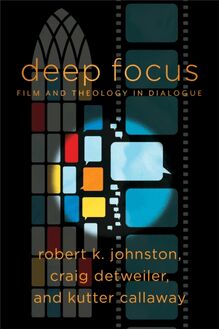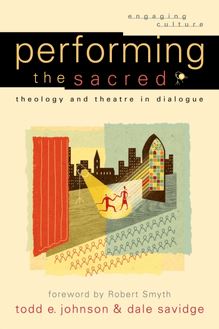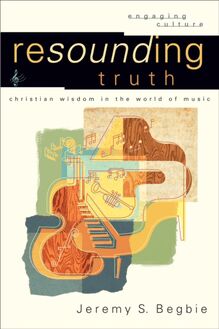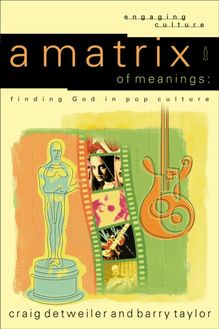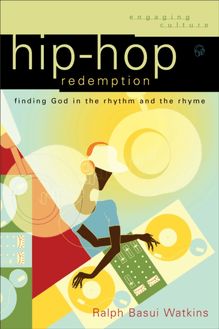-
 Univers
Univers
-
 Ebooks
Ebooks
-
 Livres audio
Livres audio
-
 Presse
Presse
-
 Podcasts
Podcasts
-
 BD
BD
-
 Documents
Documents
-
- Cours
- Révisions
- Ressources pédagogiques
- Sciences de l’éducation
- Manuels scolaires
- Langues
- Travaux de classe
- Annales de BEP
- Etudes supérieures
- Maternelle et primaire
- Fiches de lecture
- Orientation scolaire
- Méthodologie
- Corrigés de devoir
- Annales d’examens et concours
- Annales du bac
- Annales du brevet
- Rapports de stage
La lecture à portée de main
Vous pourrez modifier la taille du texte de cet ouvrage
Découvre YouScribe en t'inscrivant gratuitement
Je m'inscrisWatching TV Religiously (Engaging Culture) , livre ebook
Découvre YouScribe en t'inscrivant gratuitement
Je m'inscrisEn savoir plus
Vous pourrez modifier la taille du texte de cet ouvrage
En savoir plus

Description
Sujets
Informations
| Publié par | Baker Publishing Group |
| Date de parution | 15 novembre 2016 |
| Nombre de lectures | 0 |
| EAN13 | 9781493405855 |
| Langue | English |
| Poids de l'ouvrage | 1 Mo |
Informations légales : prix de location à la page 0,0806€. Cette information est donnée uniquement à titre indicatif conformément à la législation en vigueur.
Extrait
cover
series page
W ILLIAM A. D YRNESS AND R OBERT K. J OHNS TON , SERIES EDITORS
The Engaging Culture series is designed to help Christians respond with theological discernment to our contemporary culture. Each volume explores particular cultural expressions, seeking to discover God’s presence in the world and to involve readers in sympathetic dialogue and active discipleship. These books encourage neither an uninformed rejection nor an uncritical embrace of culture, but active engagement informed by theological reflection.
title page
copyright page
© 2016 by Kutter Callaway and Dean Batali
Published by Baker Academic
a division of Baker Publishing Group
P.O. Box 6287, Grand Rapids, MI 49516-6287
www.bakeracademic.com
Ebook edition created 2016
All rights reserved. No part of this publication may be reproduced, stored in a retrieval system, or transmitted in any form or by any means—for example, electronic, photocopy, recording—without the prior written permission of the publisher. The only exception is brief quotations in printed reviews.
Library of Congress Cataloging-in-Publication Data is on file at the Library of Congress, Washington, DC.
ISBN 978-1-4934-0585-5
Unless otherwise indicated, Scripture quotations are from the Holy Bible, New International Version®. NIV®. Copyright © 1973, 1978, 1984, 2011 by Biblica, Inc.™ Used by permission of Zondervan. All rights reserved worldwide. www.zondervan.com
Scripture quotations labeled NET are from the NET Bible®, copyright © 1996–2006 by Biblical Studies Press, L.L.C. http://netbible.com. Used by permission. All rights reserved.
contents
Cover i
Series Page ii
Title Page iii
Copyright Page iv
Acknowledgments vii
Introduction: Turning Us On 1
1. The Pilot Episode: What Is TV? 19
2. Becoming TV Literate: Formal Analysis 37
3. Becoming TV Literate: Process and Practice 63
4. The Telos of TV 87
5. A Very Brief History of the Church and TV 109
6. Channeling Theology: TV and God’s Wider Presence 137
7. Ethics: Is There Anything Good on TV? 163
Conclusion: The Season Finale: To Be Continued 195
Appendix: Theology from TV 215
Glossary of TV Terms 237
Notes 241
Index 265
Back Ad 271
Back Cover 272
acknowledgments
“Theological experts must unite their best insights with those of professional script writers.” 1 Edward J. Carnell penned these words in 1950, long before TV became the cultural force that it is today. But in a very real sense, this book—written nearly sixty-five years later—takes his suggestion to heart. Without knowing exactly what we were getting ourselves into, Dean Batali and I (one of us a professional TV writer and the other a professional theologian) agreed to collaborate on a project exploring the theological significance of television for the contemporary world. What emerged from our countless conversations over coffee (what else?) is a final product that neither of us would have entirely anticipated when we began. As with any real dialogue, we did not always agree with each other, and sometimes our disagreements seemed intractable. But at the end of the day, our ongoing and often animated dialogue helped to produce something far more interesting and, indeed, life-giving than anything we could have created on our own. (At one point we thought we should publish the transcripts of our conversations!) So while it is often said that no book is written alone, in this case it is literally true. Although I (Kutter) wrote the bulk of what follows, every word was birthed from the kind of interaction that I think Carnell envisioned years ago—a process in which the best of my theological insights were sharpened and deepened by Dean’s insights into TV storytelling and the TV industry. As a result, whatever we have done here that is worthwhile is the result of Dean’s contributions. But any and all of the book’s faults are of my own making. I am thankful for both his partnership and his commitment to the hard work of collaboration, but even more so for the friendship that has resulted from our time together.
Matt Aughtry joined us at an early stage in the process, serving as both sounding board and de facto consultant regarding the direction our project was heading. In addition to putting up with two fast-talking loudmouths, he fastidiously recorded the aforementioned transcripts of our numerous coffee conversations. We are incredibly thankful for his assistance, even when all we could do was pay him with coffee and pastries for his hard work. Matt also served as the teaching assistant for the Theology and TV class at Fuller Theological Seminary that I first offered in spring 2015. The students in that class read early drafts of the manuscript and offered helpful and challenging feedback. The book is a result of conversations with those students as much as it is a product of the conversations between Dean and me.
Rob Johnston and William Dyrness, the general editors for this series, offered us much-needed insight, wisdom, and encouragement along the way. They also happen to be two theologians whose work has left an indelible mark on my own understanding of theology and culture. Their influence on this work cannot be overstated.
Catherine Barsotti deserves her own line of acknowledgment for coming up with the original idea for this book, and for suggesting that the two of us work together on it. Although Dean and I were not present at the time, nor did we even know each other, it was Catherine who pointed out not only that a book of this sort needed to be a part of the Engaging Culture series but also that we were the two people to write it. We both owe a debt of gratitude to Catherine for shouting out our names in those early brainstorming sessions, which somehow led to us coauthoring this book.
Robert Hosack and the team at Baker Academic supported the project from the very start. Bob was a great advisor regarding some of the crazy ideas I kept throwing at him about transmedia content and the book’s online presence. To wit: we have developed a number of supplemental resources for the book that can be found at www.bakeracademic.com/WatchingTVReligiously. Elijah Davidson of Reel Spirituality gathered together the various contributors for this project, each of whom has taken what Dean and I wrote and expanded upon it in fun and insightful ways. Of particular note are Avril Speaks, Richard Goodwin, and Matthew Pittman. We encourage readers to check out these resources as a complement to and an extension of all that is found in the book.
Dean would like to thank Chris and Kathy and Karen and Jim for discussing the bigger issues of both life and TV, and the writers of Act One and Poiema for wandering along on the journey. Thank you also to Sean and Catherine, for not falling asleep on the couch. Mostly, thanks to my wife, Beth, for watching with me, and allowing me to hit “pause” and explain to her what the writers should have done.
Finally, I (Kutter) also want to thank the women in my life who willingly endure extended periods of time in which their father or husband is either writing, thinking about writing, or planning on thinking about writing. My three daughters are growing up in a world where they are surrounded by screens of every kind, accessible at every moment. In many ways, this book is about the world we are envisioning for them. Likewise, my wife and I have always shared a fondness for TV and film stories. But as our little tribe has grown, we have discovered the beauty of domestic life, which means that our viewing habits have shifted from film to television, the location of our screenings from the theater to the living room. It is in this shared domestic space, accompanied by these four beautiful women (Jessica, Callie, Mattie, and Maeve), that something as simple as a TV show can become imbued with a meaning beyond meaning. As with all my work, this book is dedicated to them.
Visit www.bakeracademic.com/professors to access study aids and instructor materials for this textbook.
introduction
turning us on
Season 1: Episode 1, “Pilot”
The scene opens in complete DARKNESS.
A single, four-letter word emerges from the background. The stark, all uppercase font slowly comes into focus. It reads:
LOST.
A cacophonous SOUND rises from the silence. It is more of a semi-structured noise than instrumentation per se—the relentless chaos of nature being held at bay, but always on the verge of breaking free of its sonic constraints. The text is continually moving, unmoored from the center of the screen. It twists and turns, slowly shifting to the foreground until it swallows us whole. Down the rabbit hole we go.
SMASH CUT TO:
An extreme close-up of an EYE. The eyelid OPENS to reveal a dilating pupil. First there is sight; then there is seeing. Consciousness arrives. The frame widens. The owner of the eye is wearing a suit and a tie. He is bleeding from the head. He is lying on the floor of a jungle—out of place, disoriented, and alone. Muffled sounds slowly transform into piercing screams.
The man rises to his feet, staggers, and then regains his balance. He finds his footing and begins to run. The dense trees and undergrowth fade into a blur as he races toward the sound of those crying out for help. He emerges from the forest and onto a BEACH.
He stops dead in his tracks.
Crystal-blue waves are lapping at the shore. The sand is white and untouched—serene even. The camera slowly moves along the shore of the beach, in tandem with the man’s gaze. What comes into view is jarring given this picturesque tableau.
The man sees nothing but CHAOS.
The fiery wreckage of an airplane is scattered along the beach. Dead and wounded PASSENGERS are strewn about the debris. Survivors are hysterical, barely aware of themselves or others.
The man begins to assess the situation and treat the wounded. (That he is a doctor becomes evident as he administers CPR, dresses wounds, and assists a woman who is in labor.) He instructs one
-
 Univers
Univers
-
 Ebooks
Ebooks
-
 Livres audio
Livres audio
-
 Presse
Presse
-
 Podcasts
Podcasts
-
 BD
BD
-
 Documents
Documents
-
Jeunesse
-
Littérature
-
Ressources professionnelles
-
Santé et bien-être
-
Savoirs
-
Education
-
Loisirs et hobbies
-
Art, musique et cinéma
-
Actualité et débat de société
-
Jeunesse
-
Littérature
-
Ressources professionnelles
-
Santé et bien-être
-
Savoirs
-
Education
-
Loisirs et hobbies
-
Art, musique et cinéma
-
Actualité et débat de société
-
Actualités
-
Lifestyle
-
Presse jeunesse
-
Presse professionnelle
-
Pratique
-
Presse sportive
-
Presse internationale
-
Culture & Médias
-
Action et Aventures
-
Science-fiction et Fantasy
-
Société
-
Jeunesse
-
Littérature
-
Ressources professionnelles
-
Santé et bien-être
-
Savoirs
-
Education
-
Loisirs et hobbies
-
Art, musique et cinéma
-
Actualité et débat de société
- Cours
- Révisions
- Ressources pédagogiques
- Sciences de l’éducation
- Manuels scolaires
- Langues
- Travaux de classe
- Annales de BEP
- Etudes supérieures
- Maternelle et primaire
- Fiches de lecture
- Orientation scolaire
- Méthodologie
- Corrigés de devoir
- Annales d’examens et concours
- Annales du bac
- Annales du brevet
- Rapports de stage

